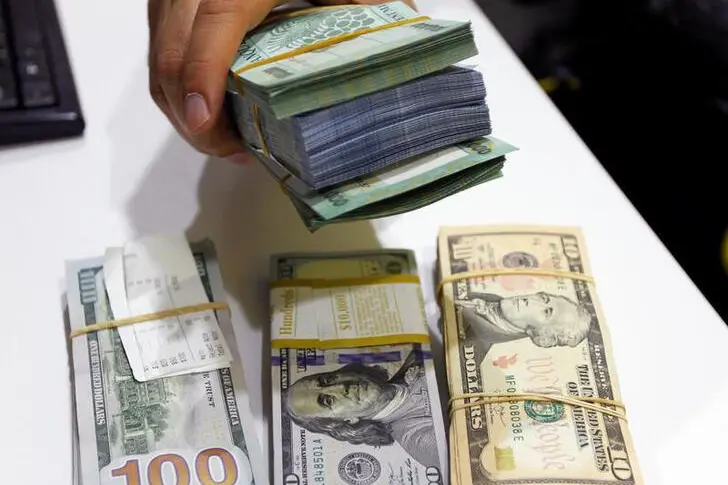PHOTO
BEIRUT: The dollar rate on the black market retreated Friday to an average of LL8,200 after the reopening of Rafik Hariri International Airport and the pledge of the Central Bank to provide lenders with hard currency to finance imports.
The U.S. dollar reached LL10,000 Thursday on the black market but the rate suddenly retreated by nearly LL2,000 as many Lebanese expatriates and passengers brought with them large amounts of dollar banknotes to help support their families.
The head of the Syndicate of Money Changers, Mahmoud Halawi told The Daily Star that many Lebanese passengers and expatriates are bringing with them a lot of dollar banknotes and this has helped ease demand for the greenback on the black market.
This will improve the supply of the dollar in the Lebanese market and hence many residents who thought to buy these bills from the black market at outrageous rates will refrain from doing so in the future, he explained.
The Central Bank has been supplying the licensed exchange dealers with around $3.5 million a day which were mainly generated from the dollars sent to the Lebanese through Western Union and other money transfer companies.
Central Bank Governor Riad Salameh Friday confirmed that trading would start in dollars through exchangers the following week, in particular regarding the importation of goods, local media reported.
Salameh and the President of the Association of Banks in Lebanon Salim Sfeir agreed with the government Thursday to supply importers with dollar banknotes to buy goods from abroad at a rate of LL3,200.
BDL and the Economy Ministry are also planning to subsidize 280 consumption items at a rate of LL3,200 and this is expected to lower the prices of these goods at supermarkets and stores as well as drastically decrease the demand on the dollar in the black market.
The Central Bank will support these food items with $1 billion from its foreign currency reserves over on year. This means that close to $100 million will be injected by the Central Bank each month to subsidize the basic food items, Halawi said.
He added that the merchant will no longer buy dollars from the black market to buy goods from abroad.
This way the merchant will be compelled to lower his prices if he started buying the dollar banknotes at a rate of LL3,200 instead of LL9,000 or LL10,000, Halawi said.
He expected the Central Bank to apply the decision to subsidize basic food items within days at the most.
Halawi revealed that the syndicate will introduce a plan to the Central Bank and the government to help ease the pressure on the dollar.
What we are proposing is that we subsidize through the licensed traders other items that are not listed by the Economy Ministry and this will also decrease the demand for the dollar in the black market, he said.
The spike in the dollar rate has caused the prices of almost all commodities to increase manyfold over the last three months and has also drastically reduced the purchasing power of Lebanese families who are paid in Lebanese pounds.
The depreciation of the Lebanese pound and the astronomical increase in the prices of all commodities have triggered wide anti-government protests and led to the closure of many companies and stores.
But economists stress that these measures by the Central Bank may not be sufficient to lower the dollar rates drastically if they are not matched by government reforms and massive cash injection from abroad.
Copyright 2020, The Daily Star. All rights reserved. Provided by SyndiGate Media Inc. (Syndigate.info).





















